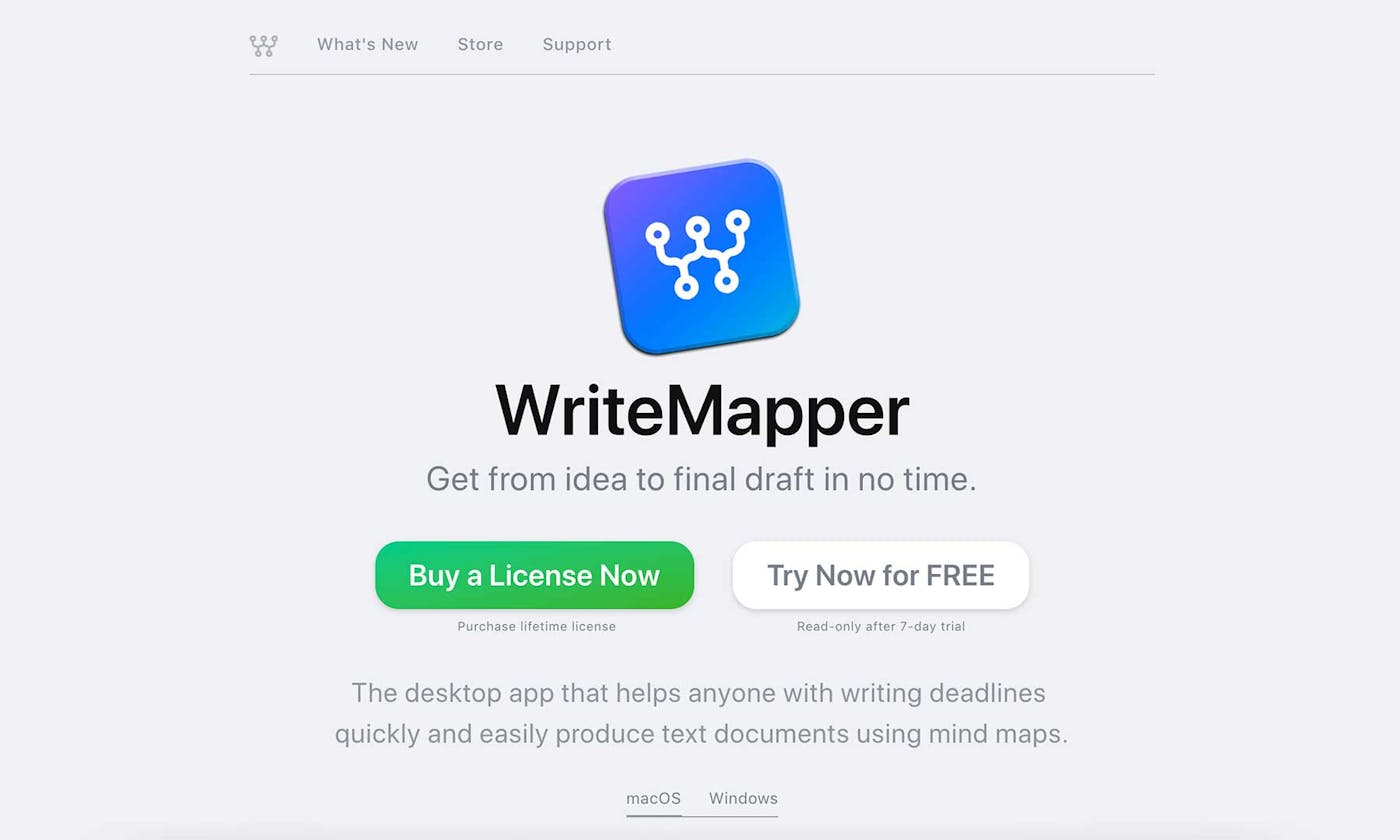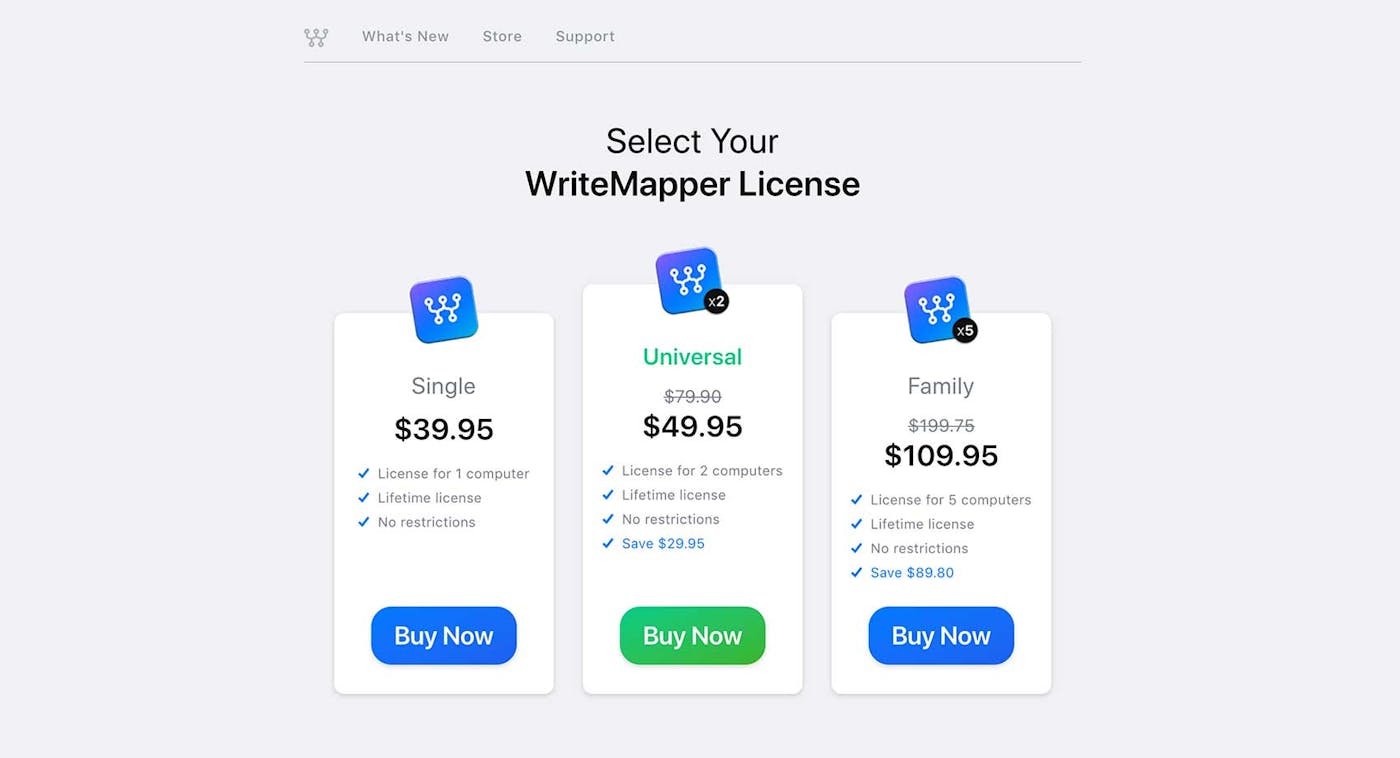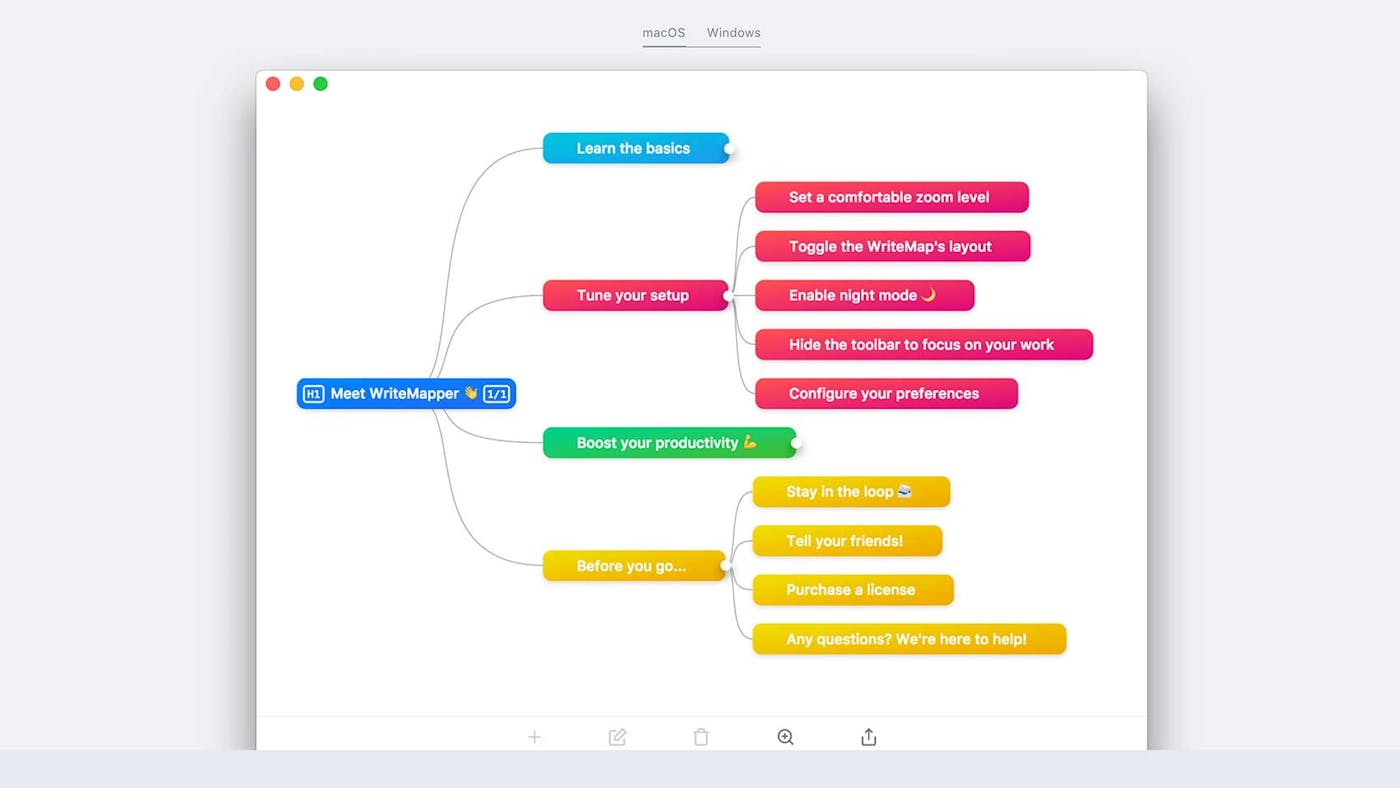How I Learned From Past Mistakes to Build a Revenue-Generating
Product
Hello! What's your background, and what are you working on?
My name is Guan, and I'm a 28 year old self-taught designer and developer living in Singapore.
Throughout school, I was your typical overachiever. I scored straight A's, was captain of the sports team, and school prefect. While in university, I created a revenue-generating school merchandise campaign, started and led a brewery club (yes, 🍺), and was also was an active member of student government. I dropped out of my computer science course after a year and a half to pursue building my own software product businesses, which has proven to be a lot harder than I expected.
In August 2017 I launched WriteMapper, a mind-mapping desktop app that helps anyone who's writing on a deadline quickly and easily turn their ideas into text documents. Month-to-month revenue has been inconsistent, but on average WriteMapper has made approximately $1,000 per month.

What motivated you to get started with WriteMapper?
I started working on WriteMapper because I grew tired of failing. In my early twenties I bought myself time to work on my own software products by doing freelance web development. I did this for years, hoping to find the same kind of SaaS successes that was getting so much attention in the media. After working on at least half a dozen projects that didn't bear any fruit, I decided to buckle down and fully commit to making money from my own products.
Once this became the focus, the next step was to identify a kind of software product that people would be willing to pay a decent amount of money for. I had become disillusioned with SaaS products after so many failures, so I know I wanted to steer clear of that. I decided to build a macOS productivity app that could help its users do their jobs quicker and better, since existing apps in this category already sold at prices ranging from $20 to $200 per copy.
After that, I needed to figure out what the app would actually do. For this, I adopted Trevor McKendrick's approach to product idea generation and product validation: looking through Mac App Store's top grossing apps. After my preliminary research, I whittled it down to either a mind-mapping or writing app, as there seemed to be high levels of demand for both.
I waffled on which to pick for a while, trying to justify how I could make something that would be clearly better and different from the products already out there. Mac users are a discerning bunch, and there were already a number of well designed apps in these categories that were performing very well. I also didn't want to make a cut-price competitor, so I was finding it hard to choose.
Here, I turned to the wisdom of books. Blue Ocean Strategy by W. Chan Kim argues that cutthroat competition results in nothing but a bloody red ocean of rivals fighting over a shrinking profit pool, and that lasting success comes not from battling competitors but from creating "blue oceans" — untapped new market spaces ripe for growth. Reading this book led me to an epiphany: I could combine both ideas into one, thus creating a my own blue ocean. Once I had the product idea down, it was just a matter of coming up with the perfect name, designing the app's logo, registering the domain, and starting to build the product itself.
What went into building the initial product?
In order to work on WriteMapper full-time, I took a couple of freelance web development jobs earlier in the year that would allow me to cover my living expenses as long as I lived frugally. I found it important to commit fully, as I never had a good experience splitting my time and attention between multiple things at once.
WriteMapper is a desktop app built on the Electron framework. I had never made a desktop app before, but being a self-taught developer, I was very comfortable diving into new framework and learning the landscape in order to get the product out. It took about four months of full-time development before I had an app that I felt comfortable showing the world. Initially, it was only offered on macOS, though I've since opened it up to Windows as well.
To do a good job with the product design, I always consider the ideal user experience before I start writing a single line of code. My best design work has always been done with just a blank, A3-sized piece paper and a pen. This approach paid off for WriteMapper, as I've been given feedback that people really like the app because of how well it's designed.
One other thing I paid particularly close attention to was where to draw the line between creating a feature-rich product, and reducing scope so that I was able to launch as soon as possible. To help with this, I first distilled the essence of what the product was supposed to do for its users into a very clear and simple statement: to help users turn their ideas into a text document draft, in no time at all. This guiding statement helped me to make decisions, such as launching the product without image support, adding that only after its release.
How have you attracted users and grown WriteMapper?
WriteMapper was first launched on Product Hunt, where it was relatively well received, getting featured on the front page and gaining over 500 upvotes. Product Hunt attracted about 1.6k visitors to my website within two days, and my first paying customer came within just a few hours of posting.
After the intial wave of visitors from PH, I posted WriteMapper to Reddit's /r/macapps, making sure to share details I thought were interesting, and replied to every comment that came in. As a small subreddit that 1) doesn't get many posts to begin with and 2) typically gets posts with no effort made to either provide a background story or active comments by the original poster, I was able to have my post stay on the front page of the subreddit for quite a while.
It was also around this time that I started actively reaching out to mainstream online press outlets that looked like they would be willing to cover a newly released macOS app. I searched as many app news sites as I could within a day, making sure to identify journalists that had previously written about other Mac apps. From there, I was able to create a shortlist of 24 journalists to contact, and sent each of them a short and concise email pitch. This effort got WriteMapper featured on Forbes and Cult of Mac.
I then decided to go a little bigger, and post it to /r/apple, which has more than 600k subscribers (compared to /r/macapps's 19k). Besides making sure to stick to the subreddit's rules, I also used WriteMapper's positive reception on /r/macapps and Cult of Mac as social validation that the product would be something of interest to this community as well. That post took off, ending up with 1.3k upvotes and attracting almost 9k visitors to WriteMapper's website.
Cumulatively, these efforts attracted almost 16k visitors within the first two weeks alone of WriteMapper launching, and about 21k page views, which then translated into actual sales.
| Day | Visitors |
| Aug 21 | 5 |
| 22 | 1607 |
| 23 | 568 |
| 24 | 370 |
| 25 | 257 |
| 26 | 119 |
| 27 | 354 |
| 28 | 1854 |
| 29 | 589 |
| 30 | 244 |
| 31 | 320 |
| Sep 1 | 266 |
| 2 | 8732 |
| 3 | 1027 |
| 4 | 307 |
Note: the spikes in traffic were due to my posts on Product Hunt, /r/macapps, and /r/apple, respectively.
What's your business model, and how have you grown your revenue?
WriteMapper is sold as a consumer app that customers can purchase for a one-time fee from our website. It started out priced at $26.95 for a single copy, $38.95 for two and $89.95 for five. I recently raised those prices to $39.95, $49.95 and $109.95, which doesn't seem to have had any detrimental effects or caused any negative feedback from new customers.
I feel like for certain B2C products, including productivity desktop apps like WriteMapper, a one-time purchase business model can turn out to be more efficient than implementing recurring billing. The nature of these kinds of apps is just better suited for a one-time payment. On top of that, many consumers balk at having to pay even a mere $3/month for an app, which can also cast a shadow of negativity over how your product and brand are perceived.

Before posting to Product Hunt, I made it a point to have already implemented Stripe on WriteMapper's website, which was really quick and super easy to do. This allowed the app to be profitable at launch, although the volume of sales has decreased dramatically since the initial flurry of launch activity. Averaged out, the app has made about $1,000 a month since launch.
Here's what a month-to-month revenue breakdown looks like:
| Month | Revenue |
| Aug 17 | 701 |
| Sep 17 | 3399 |
| Oct 17 | 1383 |
| Nov 17 | 541 |
| Dec 17 | 756 |
| Jan 18 | 316 |
| Feb 18 | 179 |
| Mar 18 | 290 |
What are your goals for the future?
Looking at my month-to-month revenue numbers, I can see that revenue is strongly correlated to the exposure that WriteMapper is getting at any given moment. The number one problem the app is facing is obscurity. I plan to tackle this in two ways:
First, by releasing an iOS version of the WriteMapper app. Releasing another app will allow another launch event to take place, hopefully with similar levels of activity and buzz. New and noteworthy products also get covered in online press, which will get WriteMapper more exposure. Developing the app to a point that I'm happy with has been time-consuming and very difficult, but it looks like I should be able to launch it soon.
Second, I've recently started a blog where I share my thoughts and research on starting and working on an indie business. I've always felt like I have a lot of interesting ideas and strong opinions bottled up in my head about things startup or business related, and this has been a good way to get them out while also creating more exposure for my products. Having a great tool like WriteMapper (really, it's incredible — I surprised even myself with how easy the process became the first time I used it while writing) makes it really easy to come up with the content, and I will soon be publishing more of my writing.
What are the biggest challenges you've faced and obstacles you've overcome? If you had to start over, what would you do differently?
The startup world glorifies failure as a badge of honor, stripes you've earned that you should be proud of — but damn did I get tired of creating products that nobody paid for for years on end. Having fallen prey to the startup rhetoric that ideas aren't important, I went all-in on execution as soon as I had an inkling of an idea to work on many more times than I should have, thinking that just doing the work would get the product somewhere.
My thinking about how to start a business was too firmly entrenched in the writing and business philosophy of Paul Graham, and I failed to identify that great startups in their early stages often are not terribly great businesses.
I wasn't a founder in Silicon Valley who had just raised a million dollars for my new startup looking to hire fifty employees over the next year, so why should I also try to build what they were building?
I needed to back up and shift my focus, and address the problem of inexperience. I didn't know enough to figure out how to start a good business on my own. It took a while, but once I identified the issue, I started to turn to books for clues and insights, and that's been tremendously helpful.
Have you found anything particularly helpful or advantageous?
The one thing that helped me most in trying to build a profitable product was reading. In fact, I would go as far as to say that if I could do it all over again, I would have spent the first half a year just being a student and devouring books. Reading became most impactful when I started to treat it more as a form of study, by taking notes alongside actually reading the book. I also became more discerning about what I read, by doing research into what books might be able to answer specific questions that I had, or to address specific gaps in my knowledge.
Aside from that, working alone has really simplified the decision-making process. Without anyone else around, there's obviously no need to communicate my ideas to another person on the team, have them mull it over, and wait on their decision in order to reach a consensus. I find that whole process be quite inefficient.

Being pretty much self-taught when it comes to design and development work has also helped tremendously. When it comes to creating software products, I can produce a very good result at no cost to me other than time and effort. This also fostered a can-do-anything mentality that helped me embrace challenges rather than shy away from them.
Lastly, I have to mention my girlfriend, who I've been with since being ensnared by her beauty 😉 while in university. She's always been there for me and has been a pillar of emotional support through the highs and lows that I've experienced throughout the past couple of years. Without her, I would have given up on starting something altogether, and WriteMapper definitely wouldn't exist.
What's your advice for indie hackers who are just starting out?
There's been a lot of advice in Indie Hackers urging people to start by just launching something, anything. I actually needed to hear a bit of the opposite — to be more intentional and selective of where I chose to put my time and energy. The ideal approach is probably somewhere between these two extremes, so you need to be sufficiently self-aware and honest with yourself in order to determine which is the right advice for you.
To refine your mental model of what makes a business work, I would encourage reading early and deliberately. Treat yourself like a student again, and work to actively comprehend the knowledge that you're consuming. Of all the books I've read, these three have been, by far, the most impactful:
- Blue Ocean Strategy by W. Chan Kim and Renée Mauborgne. Game-changing in the way I thought about how to design a business and determine if your idea is any good.
- The One Thing by Gary Keller. The most powerful concept on personal and business productivity I've come across.
- How to Get Rich by Felix Dennis. The late Felix Dennis himself was worth hundreds of millions, so he knows what he's talking about. Written to be extremely honest and to the point, this book helped me iron out logical inconsistencies in my mentality.
Also, don't dismiss your initial successes, however small. Give your business the time and effort it needs from you to grow instead of setting expectations for it to take off immediately. Just because the successes you've heard about in the news seems like it happened overnight doesn't mean that all successful products are successful instantaneously. Take what you can from these stories and treat them as clues in forging your own path to success. Copying wholesale what they did to achieve their success will probably not lead to the same outcome for you, because you aren't them — know the context you're in, and how it's different from that of others.
Where can we go to learn more?
You can visit WriteMapper's website to learn more, where there's also a free trial available for download. I also will be publishing long-form essays on what I've learned building an indie software business on my blog, ClearFounder.
Thank you for your time and attention! I hope this interview has managed to be of help in starting and growing an indie business of your own. I'm be happy to elaborate on any part of the interview and my experience, just let me hear your thoughts and questions in the comments section below!
